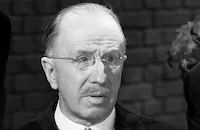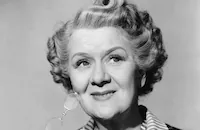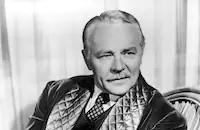Make Me a Star

Brief Synopsis
Cast & Crew
William Beaudine
Joan Blondell
Stuart Erwin
Zasu Pitts
Ben Turpin
Charles Sellon
Film Details
Technical Specs

Synopsis
Small town delivery boy Merton Gill dreams of being a motion picture star, much like his hero, Western star Buck Benson. Although he is taken seriously by Tessie Kearns, a spinster whose screenplays are continually rejected by Hollywood studios, he is the laughingstock of the rest of the town of Simsbury. Merton works in the grocery store of his hard-hearted adoptive parents, Mr. and Mrs. Gashwiler, but when Mr. Gashwiler catches him using their horse to take Western-style photographs, he fires him. That night, Merton prays to God to make him a star, and the next day, he travels to Hollywood. After a long journey, his first stop is at Majestic Productions, producers of Buck Benson Westerns. The studio guard refuses to let him on the lot, however, advising him that only those working for the studio are allowed in, and directs him to the casting office. Merton eagerly approaches the secretary of the casting office, known as The Countess, a cynical woman who has seen all types, but before he can utter a word, he is told, "nothing today." After actress "Flips" Montague goes into the casting director's office, The Countess takes Merton's photographs in to show them. Unknown to him, however, they are laughing at his obvious naiveté and poor acting skills, and when The Countess and Flips emerge, they only listen to him for their own amusement. Merton proudly reveals his fervent desire to be an actor, and brags about his training through the National Correspondence Academy of Acting, but when he still receives a rejection from The Countess, he vows to sit in the office every day until his "big chance" comes. After two months of unemployment, Merton is destitute, but still takes his place every morning on the bench in the casting office. One day, he pleads with The Countess to give him "extra" work, and unknown to him, Flips overhears his request and convinces a casting director to hire him as an extra for a Western. Merton is elated when he is called to work, but blows his lines and is fired from the job the same day. When he realizes that he will not be allowed back into the studio if he is not working, Merton decides to sleep there. Some days pass, and The Countess is surprised not to see Merton in the office. One day, Flips finds him scrounging in the trash for food and, taking pity on him, takes him to lunch, where she advises him to give up acting. Merton refuses, however, stating that even the attempt to make people happy like Buck Benson does is worth the sacrifice to him. Out of pity, Flips gives him money for a shave and laundry, and assures him she will get him back on the lot. She proposes to her friend, Jeff Baird, who produces comedies, that they produce a burlesque on Westerns starring Merton, who is so serious that he does not even realize he is funny. Five minutes with Merton convinces Jeff that Flips is right, and they hire him for a Western, but refrain from telling him that it will actually be a comedy, which Merton thinks is the lowest form of entertainment. Merton approaches his performance with grave seriousness, unaware that the entire cast and crew are laughing at him. Finally, the night of the preview arrives, but Flips has second thoughts about attending with Merton, who has fallen in love with her, because she is embarrassed that she has lied to him about the film and knows he will be humiliated by the audience reaction. When Flips pretends to be ill, Merton attends the premiere alone and is mortified when the audience laughs uproariously at the falsetto voice that was dubbed over his own, and the various comic antics therein. Feeling betrayed, Merton leaves before the film is over and returns to his boardinghouse, where his fellow boarders congratulate him on his success. Merton is unable to accept the compliments, however, and the next morning, he overhears a conversation between a director and Buck Benson, in which the director hails Merton as a comic genius. This is too much for Merton, who makes a reservation for a train home. Before going to the station, he stops at Flips's home to give her a watch he had previously bought for her. Flips urges him to give her what's coming to her, but he pretends to be nonchalant, until he works himself into tears. Flips takes him in her arms and consoles him, and tells him he is "darn near perfect."

Director
William Beaudine
Cast

Joan Blondell

Stuart Erwin

Zasu Pitts
Ben Turpin

Charles Sellon
Florence Roberts
Helen Jerome Eddy

Arthur Hoyt
Dink Templeton

Ruth Donnelly

Sam Hardy
Oscar Apfel
Katherine Clare Ward
Frank Mills
Polly Walters
Victor Potel
Bobby Vernon
Snub Pollard
Billy Bletcher
Bud Jamison
Nick Thompson

Maurice Chevalier

Sylvia Sidney

Claudette Colbert

Gary Cooper

Tallulah Bankhead
Clive Brook

Fredric March

Phillips Holmes

Jack Oakie

Charles Ruggles
Crew

Film Details
Technical Specs

Articles
Make Me a Star
With its portrait of a movie hopeful who perseveres even when his prospects seem hopeless, Make Me a Star is a celebration of the lure of stardom. Erwin plays a small-town boy who, after taking a mail-order acting course, decides to go to Hollywood to become the next Tom Mix. His lack of talent makes him a film-set pariah until a sympathetic actress (Blondell) gets him a job in a Western parody, though nobody bothers to tell the clueless amateur that he's the comic relief. Make Me a Star's ad campaign played up Erwin's aspirations with the tagline "Thousands Dream of it! Pray for it! Pay for it! But few ever achieve it."
Merton Gill was the creation of Harry Leon Wilson, who told his story in the novel Merton of the Movies in 1919. Adapted to the stage by George S. Kaufman and Marc Connelly, the original production, which opened in 1922, ran for 392 performances with Glenn Hunter in the title role. He repeated his performance in the 1924 silent film produced by Famous Players-Lasky, the predecessor to Paramount, with Viola Dana as leading lady and Charles Sellon as his foster father. With the coming of sound, Paramount decided to make a new version of the story as a showcase for their rising comic actor, Erwin. When they borrowed popular new Warner Bros. leading lady Blondell for the female lead, however, she took star billing. Sellon repeated his performance as the leading man's adoptive father. One very smart casting move was the use of silent screen clown Ben Turpin to play a character only identified in the play as "The Cross-Eyed Man," a comic actor in Erwin's starring vehicle. Turpin had starred for Mack Sennett and was so famous for his crossed eyes he even had them insured by Lloyd's of London in case they ever became uncrossed.
One of the most fascinating parts of Make Me a Star is its director, William Beaudine. In a career spanning seven decades, Beaudine earned the nickname "One Shot" for his ability to finish films quickly and inexpensively. In the silent era, he started out as a prop boy for D.W. Griffith before moving into directing, eventually helming such classics as Mary Pickford's Little Annie Rooney (1925) and Sparrows (1926). He remained a top director after the coming of sound, but an ill-timed contract in England stopped his career. Returning to Hollywood with few job prospects and little fortune (most of his money was lost in the stock market crash), he started taking jobs wherever he could, which meant a long stay on Poverty Row directing low-budget films. He directed over half the Bowery Boys films at Monogram (later Allied Artists), along with the pioneering sexploitation flick Mom and Dad (1945), one of the most profitable films ever made. He also directed Bela Lugosi in possibly his worst film, Bela Lugosi Meets a Brooklyn Gorilla (1952), and finished his career with the classic drive-in double feature Billy the Kid versus Dracula and Jesse James Meets Frankenstein's Daughter (both 1966). At the time he retired, he was, at 74, the oldest working director in Hollywood.
With its lowbrow humor and simple characters, Make Me a Star was something of a departure from the more exotic and sophisticated films Paramount was making in the early '30s. It certainly was not typical fare for March, who had, by that time, starred in such witty films as the Barrymore take-off The Royal Family of Broadway and the early screwball comedy Laughter (both 1930). But it prefigured the kinds of films Paramount would make in the '40s, after its more adult fare had begun to fizzle at the box office. Mickey Rooney and Judy Garland starred in a radio version of Merton of the Movies in 1941. MGM would have done well to buy the rights then, as a vehicle for them. But they waited until 1944, filming it three years later with Red Skelton and Virginia O'Brien. It was not a hit, but Merton has resurfaced in stage revivals as recently as 1999, when the play enjoyed a successful run in Los Angeles.
Producer: B.P. Schulberg
Director: William Beaudine
Screenplay: Sam Mintz, Walter DeLeon, Arthur Kober
Based on the novel Merton of the Movies by Henry Leon Wilson and the play of the same name by George S. Kaufman and Marc Connelly
Cinematography: Allen G. Siegler
Score: John Leipold
Cast: Joan Blondell ('Flips' Montague), Stuart Erwin (Merton Gill, aka 'Whoop' Ryder), ZaSu Pitts (Mrs. Scudder), Ben Turpin (Ben the Cross-eyed Man), Florence Roberts (Mrs. Gashwiler), Helen Jerome Eddy (Tessie Kearns), Ruth Donnelly (The Countess), Oscar Apfel (Director Henshaw), 'Snub' Pollard (Actor in Wide Open Spaces), Kent Taylor (Theatre Doorman Ticket Taker), Tallulah Bankhead, Clive Brook, Maurice Chevalier, Claudette Colbert, Gary Cooper, Phillips Holmes, Fredric March, Jack Oakie, Charles Ruggles, Sylvia Sidney (Themselves).
BW-87m.
by Frank Miller

Make Me a Star
Quotes
Trivia
Notes
The working titles of the film were Gates of Hollywood and Half a Hero. Harry Leon Wilson's novel was first filmed by Famous Players-Lasky in 1924 as Merton of the Movies, produced and directed by James Cruze and starring Glenn Hunter and Viola Dana (see AFI Catalog of Feature Films, 1921-30; F2.3570). M-G-M bought the rights to Merton of the Movies from Paramount in 1947, and released a film of the same name directed by Robert Alton and starring Red Skelton and Virginia O'Brien.














